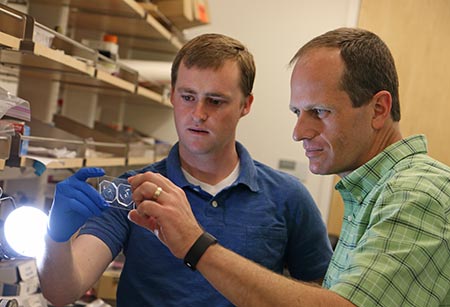University of Utah Mechanical Engineering Ph.D. student, Alex Jafek, advised by Mechanical Engineering professor Bruce Gale, received a 2016 NSF Graduate Research Fellowship. The NSF uses the Graduate Research Fellowship Program to recognize and support outstanding graduate students in NSF-supported science, technology, engineering, and mathematics disciplines.
In explaining his feelings about receiving the award and the path that has gotten him here, Jafek said, “I am both very honored and very humbled. I know I wouldn’t have gotten here without the help of many great mentors who gave me opportunities to become involved and gave me their time and mentorship to help me learn.”
As a graduate student at the University of Utah, Jafek will work in the State of Utah Center of Excellence for Biomedical Microfluidics, under the mentorship of the Center’s director Dr. Bruce Gale. Jafek’s work will focus on the two distinct projects: sperm isolation and rapid microfluidic PCR.
In the sperm isolation project, Jafek will work under the NSF-funded grant to create devices that isolate and store single sperm cells from low-fertility men for use in in-vitro fertilization (IVF). Success in this project will provide a device that will significantly reduce strain medical technicians by reducing a labor-intensive process from eight hours to less than one. The system should also enable more pregnancies for infertile couples than current methods. The project is done in collaboration with the Andrology Clinic at the University of Utah and with the Salt Lake-based startup company NanoNC.

Jafek will also work on the optimization of a device for continuous flow polymerase chain reaction (PCR). PCR is the process by which copies of DNA are produced for analysis in a variety of lab applications including testing for disease, analyzing cancer, and other biological studies. PCR protocols currently take about one hour, however much faster systems have recently been theorized and developed. Jafek’s work aims to provide a device ready for commercialization that could perform PCR in less than five minutes. This type of device will not only reflect significant time savings, but will also be a significant contribution to point-of-care diagnosis and many other medical products. The project is done in collaboration with the Wittwer Lab and Andrology Clinic at the University of Utah.
Commenting about his projects Jafek said, “I love the multi-disciplinary collaboration! It is so enriching to work with such knowledgeable collaborators. It really makes the work faster and the products better.”
Jafek will graduate with Honors from Brigham Young University April 21, 2016. He is a member of the engineering honors society Tau Beta Pi and the national honor society Phi Eta Sigma. He is also a student member of the AIAA and IEEE professional societies. Jafek is a graduate of Torrey Pines High School in San Diego, California and an Eagle Scout. He is the eldest son of University of Utah graduates Robert and Beverly Jafek. He is married to Jill Jafek, a Ph.D. candidate at University of Utah in the Molecular Biology program in the Tantin Lab.
Through the NSF Graduate Research Fellowship, Jafek will have the financial support of the National Science Foundation including an annual stipend of $34,000 and a $12,000 cost of education allowance for tuition and fees. He also will have access to special opportunities for international research and professional development, and the freedom to conduct their own research at any accredited U.S. institution of graduate education they choose (nsfgrfp.org/general_resources/about).